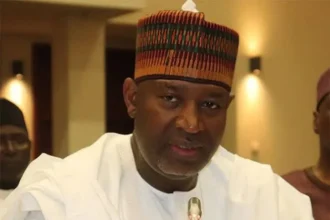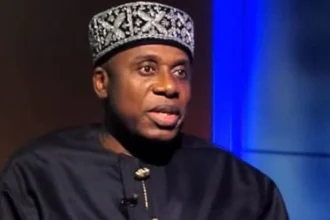...To get all news updates, Join our WhatsApp Group (Click Here)
Also Join our WhatsApp Channel (Click Here)
Production from assets operated by Addax Petroleum slumped massively from 130,000 barrels per day to 7,000bpd amid disagreements with the federal government, a new document released by the Nigerian National Petroleum Company Limited (NNPC) has revealed.
The NNPC’s latest quarterly publication of its activities indicated that the Production Sharing Contract (PSC) on Oil Mining Leases (OMLs) 123/124 and 126/137 crumbled after the Chinese-owned Addax declined to make new investments on the assets, leading to a fall of budgetary allocation from over $2 billion to barely $200,000 when the firm was exiting the assets last year.
The NNPC had on January 31, 2023 announced the termination of the 24-year deal with Addax Petroleum Development (Nigeria) Limited, marking the exit of the Sinopec of China’s subsidiary.
The official end to the business relationship came three months after the execution of the Addax Transfer, Settlement, and Exit Agreement (TSEA) for the PSC Oil blocks, OMLs 123/124 & 126/137, with the assets then transferred to the concessionaire, NNPC.
The PSC for the oil blocks was initially signed in 1973 between the NNPC and America’s Ashland, but was terminated after 25 years. Subsequently, the NNPC signed another PSC with the Swiss and then with China’s Sinopec, which retained the name Addax in 1998.
However, the Addax PSCs were associated with significant intricacies and complexities and attendant disputes, even threatening the diplomatic relations between Nigeria and China at a point.
Multiple litigations then ensued, hindering the attainment of the desired objectives of value creation to the PSC parties, government, and other stakeholders.
Now renamed Antan Producing, a Special Purpose Vehicle (SPV), the NNPC in the publication stated that after initially raising production from 7,000 bpd to 15,000bpd, the target this year is to further increase production to 30,000 bpd.
The new Managing Director of the oil asset, Sagiru Jajere, interviewed by the NNPC in-house staff, said that with the support from the parent body, the NNPC, he had begun to gradually sort out the problems with the assets.
“On the day the assets transfer agreement was signed when we took over, production was just above 7,000 bpd. But as of today, we are doing well over 12,000 barrels from OML 123 alone. We are doing another 3,000 barrels from OML 126. That is 15,000 bpd, up from 7,000 bpd, ”he said.
However, Jajere stated that more investment was required on the asset to ensure increased production.
“The only way to increase production in a sustainable manner is to get more investment. That is necessary for this business. We knew why we came down to the weak production status.
“But you can remember that at a time, we were producing well above our OPEC quota. In fact, there were times we were penalised for producing above our quota. Gradually, we saw the figures dropping, ”he added.
He argued that there are fiscal terms, which have made some investors to stay away from investing in the sector.
“Unless we do something to attract investments, all these activities we’re doing to bring up production to meet the OPEC quota will not amount to much. So, we are trying to make the business attractive so that people can come back and invest, ”he stressed.
Jajere disclosed that the NNPC had had to re-enter some wells that were shut for no real reasons, explaining that it was discovered that some wells were shut at the slightest challenge by the former operators.
“We believe that will give us a volume that will most likely take us to somewhere around 25,000 to 30,000 bpd. In the long-term, we are also looking at OML 137, which is also a big reservoir of oil with a lot of gas.
“This is a huge opportunity that we are looking at. By the time we get there, the production from Antan will be somewhere above 50,000bpd, plus the gas we want to develop and commercialise, ”he stated.
According to him, the issues with Addax were withdrawal of financial incentive package and lack of investments in the asset.
“Everything was going down. We saw it from outside. But you have to be in before you can see some things. The day I stepped into the office at Addax, that was when I realized how terribly bad things had gone, ”Jajere stressed.
If Adax was producing up to capacity, a THISDAY calculation showed that it would be adding up to 4 million barrels every month to Nigeria’s Organisation of Petroleum Exporting Countries (OPEC) quota, which at the end of 2023 was still short by over 500,000 bpd.
Head of Business Services, Victoria Iroro, said the problem with Addax was that the fiscal terms that were agreed at the time they acquired the company were not being implemented.
“Therefore, Sinopec-Addax stopped investing in the development of the assets. The government didn’t like that because it was supposed to be continuous investment.
“This was why the government, through NNPC, decided to take over the assets and operate them. That was how Antan Producing Ltd was incorporated as a special purpose vehicle to operate the assets, ”she added.
According to her, Sinopec did well until they started having issues defaulting by not investing, thereby affecting the morale of staff.
“Production went down, sagging from 130,000bpd to 20,000bpd and further down to 7,000bpd. That was how the government stepped in and decided to take it over as Antan Producing Limited, ”she said.
She argued that the takeover of Addax by the NNPC and the renaming to Anton was a good decision, which was helping to restore some confidence in the workers.
“Sometime ago in 2013, I worked in the finance department at the time and I was responsible for budget and planning. We were running a budget of $2billion and above for the operations of the company.
“But right before our eyes, we started seeing everything sliding until it got to $200,000. You can imagine how bad things went, ”she added.
On his part, the Head of Operations of the SPV, Jeremy Nnajiofor, said a security arrangement to ensure the pipelines are protected had been put in place so that production can be moved to the Agip facility nearby in order to avoid further shut down of the wells.
“And there were a lot of legacy and integrity issues. This was like a challenge because the government took over the assets to prove that a Nigerian company can run this business and grow it. So, we reviewed the situation and came up with a couple of things we needed to do at immediately. We identified the low hanging opportunities that we can explore to grow production, ”he added.
According to him the desire is to get back to above 100,000, which the assets had done in the past.
“I think it is a realisable in the mid to long term. But we need a lot of investment to achieve that, ”he stated.
You can get every of our news as soon as they drop on WhatsApp ...To get all news updates, Join our WhatsApp Group (Click Here)
Also Join our WhatsApp Channel (Click Here)












